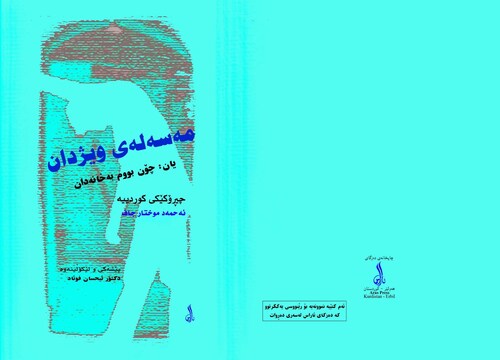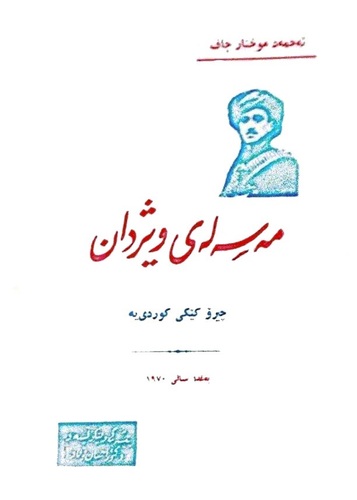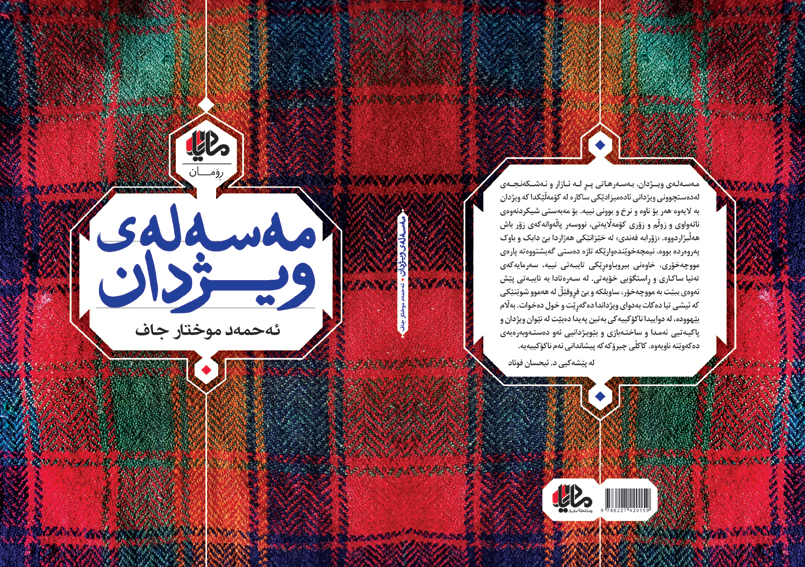A year after the publication of Jamil Saeb's novelette "In my Dream", Ahmad Mukhtar Bag Jaff, a well-known poet of classic Kurdish poems, wrote "The Conscience Issue". The novel The Conscience Issue as a narrative text is important because its writer began to write this work in a different intellectual situation that is writing poems changed his approach and wrote another literary genre, a narrative work. His story has a strong beginning. From the very beginning, when the writer determines his story's position from the very first sentence, he raises a question for the reader. A distinct kind of realization very similar to Kafka's. However, as the reader reads the story, this realization changes. In his novel "Palace", Kafka's main character is called Mr. "K". A nameless character. A question for the reader. In that story, the writer begins like this. "I was born in (H) province. In a poor family. My father was martyred in the war. I remained alone and miserable and …"
However, the question that is being created for the reader, remains unanswered due to the vague name of the place of the story in the readers' minds. Throughout the story, this system of names does not have any other effect.
Like most of the works written after "The Conscience Issue" in Kurdish, this novel, too, carries a social criticism and in fact, the writer is narrating a series of events in an un-narrative way to narrate Kurdistan's social formation at that time. At the same time, it reflects the intellectual, economic, and cultural impact of the society on the individuals. The main goal of the narrative is to convey the reality of how society can play a role in the creation, change, and destruction of individuals.
On the other hand, by introducing two social classes the dominant and those who are under domination, he illustrates the unbreakable relationship of these two groups in the Kurdish society to show that the dominants' behavior based on the under-domination class, repeats the incompatible cycle of failure for them.
The narrator of the story is also the main character of the story. In other words, all events are meaningful as long as the narrator is ready to retail them. A narrator who experiences a hard life in the city of "H" and his relatives and friends help him out until he comes of age and decides to be independent and stand on his feet.
The author summarizes all these events in a few sentences. That is, like the folklore stories, it is not about the element of time and it does not keep the logic of the story.

"I, a lonely and miserable creature, was left alone in the hands of some relatives in this world and I was deprived of the blessing of having my parents. Those relatives gave me a little to eat out of their kindness because they did not have any responsibility towards me. As I grew up, I began to understand. I figured out that I had to stand on my feet and take my life's responsibility and …"
It fills the gap between childhood and teenage with a few sentences and even in those sentences, without having a narrative background, the reader finds out that his mother, who had been mentioned a few sentences before, had died. In the third sentence of the story, it says: "I was left alone and helpless without his poor mother."
The pace of narration is very fast at the beginning of the story, however, when it reaches the teenage level of the character's life, it gets much slower and the writer even lingers on some points in this stage.
This happens because instead of having the form or technique of narration concerns, the writer is occupied with what to narrate, which is his story's subject and the world within it. Since this meaning and subject is so important to him, he has chosen a title for his story, The Conscience Issue, to emphasize it even more.
In this novelette, Ahmad Mukhtar, similar to the old Kurdish stories and world literature, breathed into a kind of moral-educational literary space. This means that the story and the atmosphere of it is a template for him to fix his own intellectual content in it. That is, how important conscience is in our world and how should we act based on it to make people happy. If one ignores their conscience, they can violate people's rights and peace. In order to introduce his intellectual idea, the writer creates several characters. The first one is a merchant shopkeeper. He calls him Wasta (Master). He becomes Wasta's apprentice and keeps his shop's notes and records but he sees that Wasta is cheating on people. One day he asks Wasta: "Is it Halal to cheat based on Sharia laws..." The Wasta answered him: "Anything that makes it easier for people to make money is Halal as long as no one commits any crimes like murder or rape! So how about the conscience issue? Hey, shut up."
Another subject that is important to Ahmad Mukhtar Jaff, even in his poems, is education. In this story, he also thinks that there is a direct relationship between education and keeping one's conscience, thus he begs his master to send his children to school, however, the master thinks, literacy makes people dumb. It shows that the writer is trying to teach something here.

The Wasta or Agha is a farmer besides being a merchant. He also spoils his workers' rights in the farming field and the writer still ponders upon his Wasta's disturbed conscience. Finally, the writer finds a solution by applying the social and economic changes and he proposes that his Wasta and the other people like him could establish a trading company instead of plundering people. This is why I mentioned from the beginning that this is a moral story. The writer bolds a problem and then he finds a solution for it. The solution is to preserve the conscience issue.
In another situation created by the author in this story, he raises a new understanding of a traditional person. He finishes his job in that person's shop and goes to another city.
"I left this city and went to another area along with a Caravan. When I arrived at the center of that district, it was a really pleasant place with beautiful gardens and clean air, but its alleys were very dirty and polluted. They were full of sewage waste, litter, and rubbish. I really felt sad and anxious after seeing this."
The narrator desires a modern city. Thus, apart from his description of the new nameless city, he conveys his sadness about the new space. He looks for a new job there, and then he becomes a writer. He got arrested for his new job, and finally, he was forced by one of his friends to ignore his conscience and pleas to that city's authority so that he would be liberated. From here, the narrator's life changes and he becomes a respected figure while he was an imprisoned person before.
"The next day I went back to the police station, you had to be there and see me. I used to stand in a corner before, but now they give me a seat to sit on it. I used to be ignored before, but now they wait for me to finish my words. I could not help but ask the commissioner: I see myself as highly respected today rather than yesterday, why is that?
I do not know myself! We only have received an order from the boss."
From here the story reaches a point where the narrator starts to ignore his conscience. Simultaneously, the other characters' lack of conscience is narrated. Finally, ignoring conscience in the author's narration makes the narrator of the story the city's mayor. Later, his rank even goes higher and he becomes a bigger city's mayor. On his way to that city, he sees that two girls are forced to marry because their family has committed murder. The author begins to bold another problem in the Kurdish society and that is forcing girls to marry in order to keep peace. He hears the girls say: "It is not fair! Someone else has committed murder, someone else has been killed, and now we have to undo all this mess and live in difficulty. We may love someone else, but why do you ignore our rights for a living? This cannot be accepted by God of conscience.
They did not know that God is patient, He had accepted thousands of such things and the conscience is just a word and no one has ever seen it"
Through the narrator, the writer expresses his message like this; In this world only, the powerful authorities can do things and there is no such thing as conscience. He also criticizes religion in the same way.
What is important as the final point of this story is that the writer, just as the first sentence of his story was unexpected, that is, a symbol of the presence of place, at the end of the story, although the one paragraph before the last, he has narrated the result of ignoring the conscience and has shown a remarkable example of the oppression of girls who were forced to marry, however once again he makes the reader doubtful.









